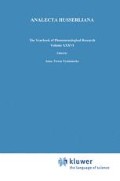Abstract
Edmund Husserl’s phenomenology offered the possibility of once again doing philosophy at a time when funereal signs were forecasting the immanent demise of the philosophical enterprise. Itself a new beginning, Husserl’s phenomenology argued that philosophy is a beginning anew, a taking up of the task of thinking and being in an original way. Many would respond to Husserl’s call. And among them would be Emmanual Levinas, who perhaps spoke for many of Husserl’s students when he said that “it was with Husserl that I discovered the concrete meaning of the very possibility of ‘working in philosophy’…”1 How was it that Husserl’s philosophy offered such a possibility?
I claim no other right than that of speaking according to my best lights, principally before myself but in the same manner also before others, as one who has lived in all its seriousness the fate of a philosophical existence.
Edmund Husserl The Crisis, I, 7, 18
Our analyses claim to be in the spirit of Husserlian philosophy, whose letter has been the recall in our epoch of the permanent phenomenology, restored to its rank of being a method for all philosophy.
Emmanuel Levinas Otherwise Than Being, 183
Access this chapter
Tax calculation will be finalised at checkout
Purchases are for personal use only
Preview
Unable to display preview. Download preview PDF.
Notes
Emmanuel Levinas, Ethics and Infinity, trans. Richard Cohen (Pittsburgh: Duquesne University Press), p. 28; hereafter, “EI.”.
Robert D. Walsh, “Husserl’s Epoche as Method and Truth,” Auslegung 14 (Summer 1988), pp. 211–223.
Edmund Husserl, Logical Investigations, 2 vols., trans. J. N. Findlay (Halle: 1900; New York: Humanities Press, 1970); hereafter, “LI.”.
Edmund Husserl, Ideas: General Introduction to Pure Phenomenology, Vol. I, trans. W. R. Boyce Gibson (1913; New York: Collier Books, 1962); hereafter, “Ideas.”.
E. Levinas, The Theory of Intuition in Husserl’s Phenomenology, trans. Andre Orianne (Paris: Alcan, 1930; Evanston: Northwestern Univ. Press, 1973); hereafter, “TI.”.
Edmund Husserl, The Crisis of European Sciences and Transcendental Phenomenology, trans. David Carr (Evanston: Northwestern University Press, 1970); hereafter, “Crisis.”.
Edmund Husserl, “Philosophy as Rigorous Science” in Phenomenology and the Crises of Philosophy, trans. Quentin Lauer (New York: Harper and Row, 1965); hereafter “PRS.”.
Author information
Authors and Affiliations
Editor information
Editors and Affiliations
Rights and permissions
Copyright information
© 1991 Springer Science+Business Media Dordrecht
About this chapter
Cite this chapter
Walsh, R.D. (1991). Husserl and Levinas: Transformations of the Epoche. In: Tymieniecka, AT. (eds) Husserl’s Legacy in Phenomenological Philosophies. Analecta Husserliana, vol 36. Springer, Dordrecht. https://doi.org/10.1007/978-94-011-3368-5_24
Download citation
DOI: https://doi.org/10.1007/978-94-011-3368-5_24
Publisher Name: Springer, Dordrecht
Print ISBN: 978-94-010-5489-8
Online ISBN: 978-94-011-3368-5
eBook Packages: Springer Book Archive

